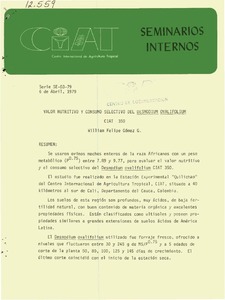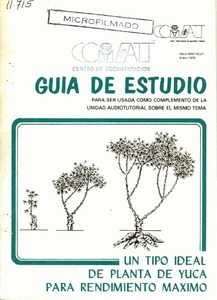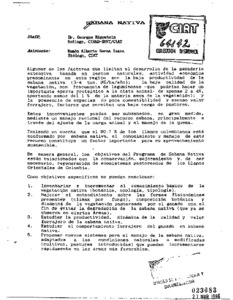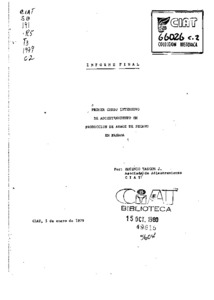Mission
To reduce hunger and poverty, and improve human nutrition in the tropics through research aimed at increasing the eco-efficiency of agriculture.
People
CIAT’s staff includes about 200 scientists. Supported by a wide array of donors, the Center collaborates with hundreds of partners to conduct high-quality research and translate the results into development impact. A Board of Trustees provides oversight of CIAT’s research and financial management.
Values
- Shared organizational ethic
- We respect each other, our partners, and the people who benefit from our work. We act with honesty, integrity, transparency, and environmental responsibility in all of our joint endeavors.
- Learning through partnerships
- We work efficiently and pragmatically together and with partners. Considering our diversity to be a key asset, we adapt readily to change and strive to improve our performance through continuous learning.
- Innovation for impact
- We develop innovative solutions to important challenges in tropical agriculture, resulting in major benefits for the people who support, participate in, and profit from our work.
Members:
Resources
Displaying 906 - 910 of 958Valor nutritivo y consumo selectivo del Desmodium ovalifolium CIAT 350
En la Estacion Experimental "Quilichao", del Centro Internacional de Agricultura Tropical (CIAT), depto. del Cauca, Colombia, se realizo un ensayo para evaluar el valor nutritivo y el consumo selectivo de Desmodium ovalifolium CIAT 350. Se usaron ovinos machos enteros de la raza Africanos, con un peso metabolico (P0.75) entre 7.89-9.77, a los cuales se suministro forraje fresco de D. ovalifolium a niveles de 30.245 g de MS/P(0.75) y de 5 edades de corte: 50, 80, 100, 125 y 145 dias; el ultimo corte coincidio con el inicio de la estacion seca.
Un tipo ideal de planta de yuca para rendimiento máximo [conjunto audiotutorial]
This audiotutorial unit (cassette, printed script, 76 color slides, study guide, self-evaluation test), prepared by the Communications Support Unit at CIAT, is available for use with a manually or automatically synchronized slide projector/cassette tape reccorder. Each unit is a vailabIe from the Distribution Office at a cost of US$ 50; photocopies of the study guide alone can be obtained from the Cassava Information Center. The objective of this unit is to present some of the results of research conducted by the physiology Section of CIATs Cassava Program.
Primer Curso Intensivo de Adiestramiento en Producción de Arroz de Secano en Panamá (1979, Cali, Colombia). Informe final
Practicas sencillas para aumentar el rendimiento del cultivo de la yuca (Manihot esculenta Crantz)
The low cassava yields obtained in L.A. at present are the result of a complex of problems: 1) deficient quality of planting material, which results in low sprouting, poor rooting and little initial vigor; 2) inadequate land preparation and planting systems; 3) control systems for pests and diseases are unknown and weed control, untimely; 4) some local var. have a low yield potential. The CIAT Cassava Program has developed a set of simple low-cost practices aimed towards increasing cassava yields.






